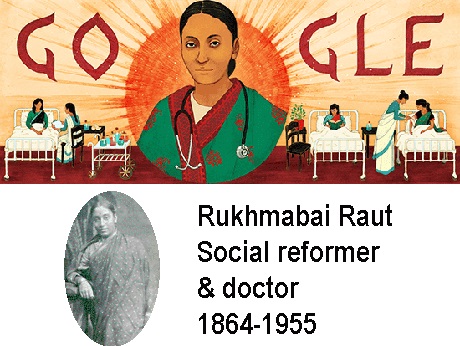
November 22 2017: Google honours Victorian-era, Indian social reformer and female doctor Rukhmabai Raut today, on her 153rd birth anniversary,with a doodle.
Rukhmabai (born November 22, 1864 - September 25, 1955), was an Indian woman who became one of the first practicing women doctors in colonial India. She was also at the heart of a landmark legal case which led to the enactment of the Age of Consent Act, 1891. She was married off at the age of eleven to a nineteen year old groom Dadaji Bhikaji Raut. She however continued to live in the house of her widowed mother Jayantibai who then married Assistant Surgeon Sakharam Arjun. When Dadaji and his family asked Rukhmabai to move to his home, she refused and was supported in her choice by her step-father. This led to a long series of court cases from 1884, a major public discussion on child marriage and on the rights of women. Rukhmabai wrote numerous letters in the newspapers under the pseudonym A Hindu Lady, winning the support of many and when she expressed a wish to study medicine, a fund was created to support her travel and study in England at the London School of Medicine. She subsequently went to England and returned to India as a qualified physician and worked for many years in a women's hospital in Rajkot. She served as chief medical officer for a total of thirty-five years before retiring to Bombay in 1929 Rukhmabai (born November 22, 1864 - September 25, 1955), was an Indian woman who became one of the first practicing women doctors in colonial India. She was also at the heart of a landmark legal case which led to the enactment of the Age of Consent Act, 1891. She was married off at the age of eleven to a nineteen year old groom Dadaji Bhikaji Raut. She however continued to live in the house of her widowed mother Jayantibai who then married Assistant Surgeon Sakharam Arjun. When Dadaji and his family asked Rukhmabai to move to his home, she refused and was supported in her choice by her step-father. This led to a long series of court cases from 1884, a major public discussion on child marriage and on the rights of women. Rukhmabai wrote numerous letters in the newspapers under the pseudonym A Hindu Lady, winning the support of many and when she expressed a wish to study medicine, a fund was created to support her travel and study in England at the London School of Medicine. She subsequently went to England and returned to India as a qualified physician and worked for many years in a women's hospital in Rajkot. She served as chief medical officer for a total of thirty-five years before retiring to Bombay in 1929. ( from Wikipedia)